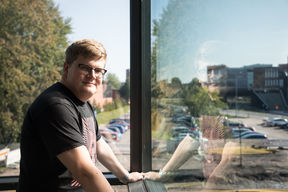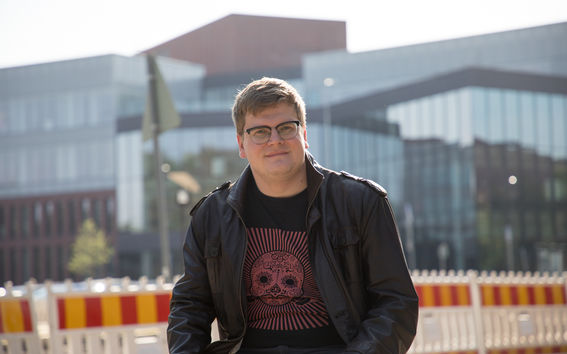Towards a better world by understanding context and user

Pietari Keskinen is interested in Africa and the possibility to participate in projects there. These two things have encouraged him to stay at Aalto University from the moment he started his bachelor’s studies, almost a decade ago.
Keskinen, a doctoral candidate in Professor Marko Nieminen’s research group, was interested in Africa already as a child. As a bachelor’s student in the autumn of 2013, he travelled to Zambia and South Africa with 50 other students as part of the Aalto in Africa student project. During the trip, Keskinen started thinking how he could use the skills he learned studying information networks at university to improve the world. It would not necessarily require ‘hard technology,’ but rather understanding the context and users.
Keskinen now works as a researcher in the Fusion Grid project, a joint project initiated by Aalto, Lappeenranta University of Technology, Nokia, Green Energy Finland and University Properties of Finland Ltd. Fusion Grid’s goal is to take workable communication and electricity networks to areas where building heavy infrastructure is uneconomic. In particular, they are interested in small communities in low and middle-income countries. The project has obtained 1.5 million euros in funding from Business Finland.
The basic element of Fusion Grid’s communications network is an LTE base station, powered by a solar panel which is also capable of storing electricity. A micro-grid that distributes electricity to a small community is built out from this solar power plant. The team at Aalto’s end consist of the Principal Investigator of the project, Professor Marko Nieminen, visiting researcher Karin Fröhlich, and master’s student Niina Arvila as well as Keskinen. ‘We focus on what types of digital services we could build when we have taken electricity and internet to the target community,’ says Keskinen.
The goal is to facilitate the use of services that help local people make a living. Keskinen focuses especially on how digital platforms could benefit people of low and middle-income countries. Uber, an app for booking and offering taxi rides, is a good theoretical example. Services such as Uber offer an opportunity for low-threshold employment but they may also create problems. In an environment without a strong social security system, they create more opportunities for making a living or improving one’s skills. On the other hand, a person looking for work through such services often have the responsibilities of an entrepreneur – but not the freedom.
The familiarity of Windhoek coders
Fusion Grid will be piloted in the Namibian town Oniipa in December. Finland’s ties with the town go back to the end of the 19th century, as the town was the headquarters of the Finnish Lutheran mission, and this year, the Finnish Embassy in Namibia will hold its Independence Day Reception in the town. The Fusion Grid pilot will be launched on the same day, with the goal being to take solar panels, the solar power plant, and a stable internet connection to Oniipa.
Pietari KeskinenI would find it interesting to something that is socially important and related to technology in Finland also.
Over the years, Namibia has become a familiar country to Keskinen. In 2015, he studied at the Namibia University of Science and Technology in Windhoek as an exchange student, where he ended up working for the research group of Professor Heike Winschiers-Theophilus.
Travelling gives an opportunity to constantly learn and experience something new, expanding ones understanding of the world. One of the most important remarks Keskinen made during his exchange studies was that, no matter where you are, people are quite similar. ‘When I was in the Namibian university scene and saw different coders, the way they dressed up and talked felt really familiar. In the way that, if we were Finland, I could have named in which company each of them works.’
Keskinen’s passion for research, too, was ignited at the Namibian university. When he travelled back to Finland, he decided to utilize the work done in Namibia in his master’s thesis, and later, professor Winschiers-Theophilus became his doctoral advisor.
Keskinen lived in Windhoek for six months, and the city has become a sort of home away from home. ‘I know it pretty well. I have networked with different kinds of parties and I know quite a lot of people in there. It’s always nice to visit Windhoek. It feels like a place that I can handle – I know how this city works.’
Information Networks programme allows one to combine technology with natural and human sciences
Fusion Grid project runs until the end of 2020. Keskinen hopes complete his doctoral studies soon after that but to work on similar projects in the future. He is also interested in increasing wellbeing somewhere close by – making use of the methods learned in previous projects to help communities like Finns at risk of social exclusion. ‘I would find it interesting to something that is socially important and related to technology in Finland also.’
Keskinen comes from Hämeenlinna, a town of 70,000 inhabitants located in between of two larger cities, Helsinki and Tampere. After upper secondary school, he knew that he wanted to move to the Helsinki region. His study advisor recommended studies in Information Networks for Keskinen and his school friends, and Keskinen thought that the programme sounds like something that enables doing of different types of things. ‘I wasn’t sure about what I wanted to do, but I was good in maths and interested in engineering.’
During his studies, Keskinen noticed that the programme comes with all-around educational elements but also helps to learn crucial, practical skills. ‘It allows you to combine technology and natural sciences with human sciences. It gives you a running start for different types of roles.’
Should Keskinen move away from Helsinki, he would miss restaurants, services, and the Helsinki Swimming Stadium where he likes to go swimming, sunbathing, and spending time with friends on summer days. ‘I enjoy living in a city.’

Pietari Keskinen, Doctoral Candidate
Education: Master of Science (Information Networks), Aalto University
Awards and grants: Grant from Kaute – The Finnish Science Foundation for Technology and Economics. Award for the best Master’s Thesis from Rajapinta ry (research community for digital social sciences).
Lives in Helsinki
Hails from Hämeenlinna, Finland
The greatest professional accomplishment: Finishing my Master’s Thesis felt like a big achievement at that time
Has also
Been interviewed for the American NBC’s morning radio show. ‘Aalto has an American football team, Aalto Predators, games of which I used to commentate. One time, Otaniemi Underground Broadcasting System came to stream the games in Finnish and in English. In the English stream, my comments were intentionally cumbersome and I made direct translations from Finnish idioms to English. The stream went viral, and for that reason, I ended up explaining in the radio what it means if I say that ‘Lappeenranta just saw where the chicken pees from.’
Gotten into punk music and started learning to play the guitar. ‘I feel a bit sorry that I’m 15 years too old, but I’m getting there anyway – with a punk attitude.’
Started playing football as an adult. ‘A few years ago, I went to the adult football school of football team HJK and I have also encouraged my colleagues to join me. The football school starts every summer and autumn.’
Read more news

Stop applying for jobs and build your own startup instead at Ignite
Applications for the Ignite summer accelerator program 2026 are open. Apply by March 8.Soil Laboratory Exhibition – Exploring the Dialogue Between Human and the Earth in Utsjoki
Soil Laboratory explores the relationship between humans and the earth as a living landscape through ceramic practices in Utsjoki.
The Finnish Cultural Foundation awarded grants for science and art
A total of 15 individuals or groups from Aalto University received grants






